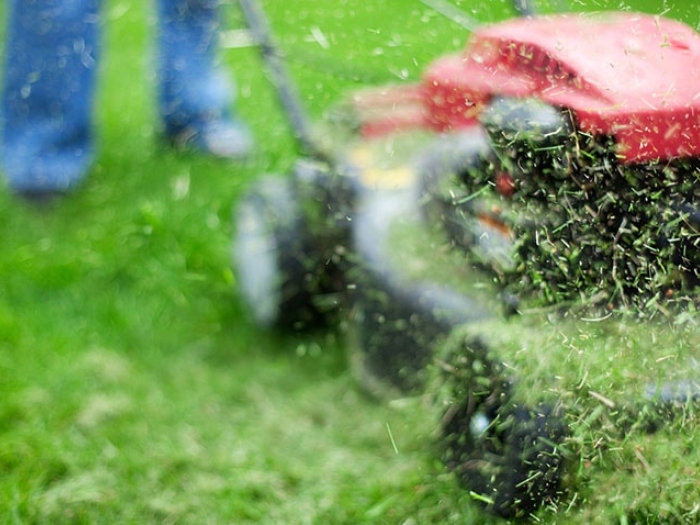Autumn chores can turn dangerous if you’re not following a few basic rules. Here’s what you need to know before touching a tool.
7:00 AM
Author |

As the weather turns chilly and the leaves begin to change, fall yard chores become a part of life.
MORE FROM THE HEALTH BLOG: Subscribe to our weekly newsletter
But last year, more than 300,000 people were estimated to visit the emergency department in 2015 for injuries related to yard and garden equipment, according to the Consumer Product Safety Commission.
As you venture into the backyard to tend to the fall chores, here are some guidelines you can use to avoid becoming part of these statistics.
Dress appropriately. Avoid loose clothing or jewelry that can be caught in equipment. Long pants, long sleeves and sturdy footwear with soles that will not slip (bonus points for steel-toe boots) can help to protect skin and guard against falls or dropped objects. Always wear eye protection, heavy gloves and hearing protection, such as earplugs, when doing chores with loud or motor-driven equipment.
Hand tools aren't always safer. Hand-operated garden tools accounted for more than 64,000 ER visits last year. Ensure that tools are in good working order, as broken pieces can cut or injure people. Be sure equipment is properly sized for the individual using it to avoid over-reaching, which can cause strains, back pain and other overuse injuries.
Respect heights. More than 256,000 people were injured in 2015 because of falls from ladders and stools (though not all of them were outdoors). Beware working at heights, whether painting, cleaning gutters or windows, or hanging holiday decorations. Read the instructions for the ladder, and ensure proper usage.
Many injuries I have seen are related to standing on a level higher than safely indicated, or failing to properly ensure the base is stable before climbing. If it feels like you are stretching the limits of safety, you likely are. Stop and find a safe way to complete the task, even if it means hiring a professional.
Find the owner's manual and read it. Before starting power equipment, check the manual and ensure all recommended maintenance is complete. Be sure all of the safety features are working properly.
SEE ALSO: 6 Things You Need to Know About Pneumonia
Survey your work scene. Check your work area and remove foreign objects that could cause injury or damage equipment, such as rocks, debris or sticks. If you will be digging into the ground with any tools, contact MISS DIG if you are in Michigan, or your equivalent local program, to ensure the area is free of underground utilities. Don't assume that there are not buried lines beneath your property.
I once saw a patient who struck a buried high-voltage line with a fence post digger. While digging in a family member's yard, with no idea a power line was buried there, he knocked out power to 1,500 nearby homes and escaped with only some tiny minor burns and scrapes.
Watch for children. As the parent of small children, I know they move fast and are often attracted to the riding mowers and powered machinery they see adults using. Be alert when using powered equipment and be sure they are not approaching tractors, mowers or other tools. Teach children to respect and avoid running equipment.
Children should never ride or drive a tractor or riding mower. Teens may be able to operate outdoor power equipment if mature and physically capable of handling it safely. Adult supervision should always be the rule, however.
Beware of stored energy. If chainsaws, mowers or other power equipment jams while running, turn off the tool, and unplug it, if it's electrical. Be aware that stored tension may remain in equipment after a jam that can cause parts to move suddenly when the obstruction is cleared. Keep well clear of moving parts and be wary of this potential injury source.
Store tools out of reach of children. Be sure you properly shut down and store equipment to ensure it cannot be started by young hands, or otherwise activated inadvertently if contacted by other objects in a shed or garage. Sharp tools should ideally be covered and kept high and out of reach.
SEE ALSO: Beware, Tiny Batteries Can Cause Big Injury for Kids
Gasoline and fire do not mix. No matter how tempted you are to speed up the process of burning leaves or yard debris, never add gasoline. The CPSC estimates 13,924 people visited the ER for injuries and burns related to gasoline. Never fill gas tanks while equipment is running if it is still hot. Clean up any spills. Never smoke or use a flame around gasoline or flammable liquids.
Electricity and water also never mix. Never use electric power tools near water or in wet conditions. Use a ground fault circuit interrupter (GFCI) to guard against electrical injury. GFCIs may be installed in newer homes, or can be purchased from hardware and home improvement stores as a plug-in type addition for your extension cord. While you are at it, be sure your extension cords are in good condition, not frayed, and are the appropriate size (gauge) to safely power the equipment you are operating.
With these guidelines, you'll be able to keep yourself, your family and your home safe and healthy this autumn.

Explore a variety of health care news & stories by visiting the Health Lab home page for more articles.

Department of Communication at Michigan Medicine
Want top health & research news weekly? Sign up for Health Lab’s newsletters today!





